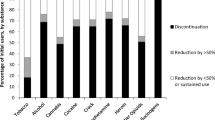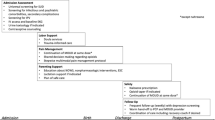Abstract
Background
Women with substance abuse disorders have lower use of contraception. Unplanned pregnancies increase risk of fetal exposure to addictive and teratogenic substances. Postpartum inpatient periods for these women can be challenging times to facilitate contraception planning.
Objective
To explore postnatal contraceptive planning practices, patient preferences for contraception, and supply challenges, and to identify how clinical pharmacists may best provide care in this context.
Setting
A tertiary maternity referral hospital in metropolitan Victoria, Australia (January 2015—December 2018).
Method
A retrospective cohort study was conducted on postnatal women with substance abuse disorders. Patients were excluded if they had delivered at another health service, had inadequate documented evidence of a substance abuse disorder, or had incomplete or unavailable medical records. Records were reviewed for demographic data, admission details, and documented contraceptive planning.
Main outcome measures
Documented contraceptive planning, patient contraception preferences and identified supply challenges.
Results
Ninety-three women were included. Seventy-one (76.3%) had psychiatric disorders or impairments, and 92 (98.9%) had identifiable follow-up challenges (eg. Homelessness). Nine (9.7%) self-discharged/absconded. Eighty-seven (93.5%) had documented postnatal contraception discussions. Sixty-two of 87 (71.3%) considered a medicine/device, three (3.4%) preferred condoms, 10 (11.5%) considered sterilisation, 2 (2.3%) preferred no contraception, and 16 (18.4%) undecided. Etonogestral 68 mg implants were most commonly prescribed (28 of 42; 66.7%).
Conclusion
Inpatient postpartum periods for this cohort were characterised by psycho-social complexities, inconsistent contraceptive planning documentation, and patients seemingly unprepared to consider contraception. This study highlights a need for an earlier decision-making process and pragmatic counselling with antenatal pharmacists.


Similar content being viewed by others
References
Australian Institute of Health and Welfare (AIHW). In: National Drug Strategy Household Survey 2016: detailed findings. Australian Government. 2017. https://www.aihw.gov.au/reports/illicit-use-of-drugs/2016-ndshs-detailed/contents/table-of-contents . Accessed 15 Jul 2020.
ABC News. In: Increasing number of pregnant women seeking help for ice addiction. 2015. http://www.abc.net.au/news/2015-10-02/increasing-number-of-pregnant-women-seek-help-for-ice-addiction/6821880. Accessed 15 Jul 2020.
Anderson AE, Hure AJ, Forder PM, Powers J, Kay-Lambkin FJ, Loxton DJ. Risky drinking patterns are being continued into pregnancy: a prospective cohort study. PLoS ONE. 2014;9(1):e86171. https://doi.org/10.1371/journal.pone.0086171.
Reid N. Australia has some of the highest rates of drinking during pregnancy. It's time to make labelling mandatory. The University of Queensland Faculty of Medicine. 2020. https://medicine.uq.edu.au/article/2020/07/australia-has-some-highest-rates-drinking-during-pregnancy-its-time-make-labelling-mandatory . Accessed 3 Nov 2020.
Popova S, Lange S, Probst C, Gmel G, Rehm J. Estimation of national, regional, and global prevalence of alcohol use during pregnancy and fetal alcohol syndrome: a systematic review and meta-analysis. Lancet Global health. 2017;5:e290–9.
Connery HS, Albright BB, Rodolico JM. Adolescent substance use and unplanned pregnancy: strategies for risk reduction. Obstet Gynecol Clin North Am. 2014;41(2):191–203.
Olsen A, Banwell C, Madden A. Contraception, punishment and women who use drugs. BMC Womens Health. 2014;9(14):5.
Lundsberg LS, Peglow S, Qasba N, Yonkers KA, Gariepy AM. Is Preconception Substance Use Associated With Unplanned or Poorly Timed Pregnancy? J Addict Med. 2018;12:321–8.
Terplan M, Hand DJ, Hutchinson M, Salisbury-Afshar E, Heil SH. Contraceptive use and method choice among women with opioid and other substance use disorders: A systematic review. Prev Med. 2015;80:23–31.
Black KI, Stephens C, Haber PS, Lintzeris N. Unplanned pregnancy and contraceptive use in women attending drug treatment services. Aust N Z J Obstet Gynaecol. 2012;52(2):146–50.
Louw KA. Substance use in pregnancy: The medical challenge. Obstet Med. 2018;11:54–66.
Hetea A, Cosconel C, Stanescu AAM, Simionescu AA. Alcohol and Psychoactive Drugs in Pregnancy. Maedica. 2019;14:397–401.
Day CA, White B, Reid SE, Fowler M, Black KI. Integration of a contraception clinic into an opioid treatment setting to improve contraception knowledge, accessibility and uptake: a pilot study. Aust N Z J Pub Health. 2020;44:360–2.
Edelman NL, Patel H, Glasper A, Bogen-Johnston L. Understanding barriers to sexual health service access among substance-misusing women on the South East coast of England. J Fam Plann Reprod Health Care. 2013;39(4):258–63.
Loree AM, Gariepy A, Ruger JP, Yonkers KA. Postpartum Contraceptive use and Rapid Repeat Pregnancy Among Women who use Substances. Subst Misuse. 2018;53(1):162–9.
Dehlendorf C, Krajewski C, Borrero S. Contraceptive counseling: best practices to ensure quality communication and enable effective contraceptive use. Clin Obstet Gynecol. 2014;57(4):659–73.
Holder KLP. Contraception and Breastfeeding. Clin Obstet Gynecol. 2015;58(4):928–35.
Loewenberg WY, Keder LM, Keim SA, Gallo MF. Postpartum intentions on contraception use and method choice among breastfeeding women attending a university hospital in Ohio: a cross-sectional study. Reprod Health. 2017;20;14(1):45
Demirci JR, Bogen DL, Klionsky Y. Breastfeeding and Methadone Therapy: The Maternal Experience. Subst Abus. 2015;36:203–8.
Krans EE, Cochran G, Bogen DL. Caring for Opioid-dependent Pregnant Women: Prenatal and Postpartum Care Considerations. Clin Obstet Gynecol. 2015;58:370–9.
Tsirigotis K. Gender differentiation of indirect self-destructiveness in drug addicted individuals (indirect self-destructiveness in addicted women and men). Psychiatr Q. 2019;90:371–83.
Coe AB, Moczygemba LR, Gatewood SB, Osborn RD, Matzke GR, Goode JV. Medication adherence challenges among patients experiencing homelessness in a behavioral health clinic. Res Soc Adm Pharm. 2015;11:e110–20.
Australian Government Department of Health. The Pharmaceutical Benefits Scheme (PBS). 2020. https://www.pbs.gov.au/pbs/home . Accessed 3 Nov 2020.
Yong TY, Fok JS, Hakendorf P, Ben-Tovim D, Thompson CH, Li JY. Characteristics and outcomes of discharges against medical advice among hospitalised patients. Intern Med J. 2013;43(7):798–802.
Acknowledgements
Authors would like to acknowledge the input of Cathy Ta in the conduction of this study.
Author information
Authors and Affiliations
Corresponding author
Ethics declarations
Funding
Authors did not have any funding to disclose for this study other than ordinary wages
Conflicts of interest
Authors do not have any conflicts of interest to disclose.
Additional information
Publisher's Note
Springer Nature remains neutral with regard to jurisdictional claims in published maps and institutional affiliations.
Rights and permissions
About this article
Cite this article
Gilmartin, C.E., Milman, O. & Leung, L. Postpartum contraceptive planning of women with substance abuse disorders. Int J Clin Pharm 43, 1006–1014 (2021). https://doi.org/10.1007/s11096-020-01209-8
Received:
Accepted:
Published:
Issue Date:
DOI: https://doi.org/10.1007/s11096-020-01209-8




